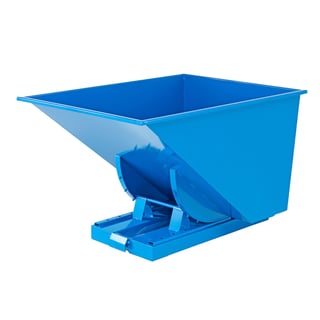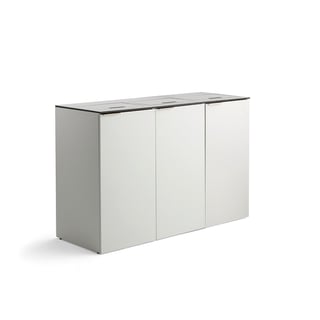
Make it easy to sort waste!

Save both energy and natural resources
Everyone benefits from waste sorting. Not only can batteries and other hazardous waste be disposed of in a safe way, waste sorting contributes greatly to environmental benefits at the manufacturing stage. For example, it's both more energy and resource efficient to create new paper from recycled material, rather than burning or dumping old paper and creating new raw materials to manufacutre more paper.
Start by sorting out the most hazardous
So how do you get started? A good tip is to start with what causes the most damage: environmentally and health hazardous waste. Some products contain substances that are toxic, explosive or flammable, and consequently harmful to humans and the environment. Used batteries, low energy bulbs, fluorescent bulbs, computers and other electrical items are examples of waste that should be separated and left at the recycling center locally. Place the hazardous waste in suitable containers while waiting for disposal / collection.

Tips! Battery bin
For practical and safe storage of small used batteries prior to recycling.
• The bin is fitted with a child-resistant lid supplied with a key lock.
• The battery bin is supplied with a bracket for mounting to a wall or post.
• The bin has a volume of 15 L.
Make it easy
The more we recycle, the better for the environment. So make it easier for your employees by placing recycling bins at convenient distances from their workplaces. In office environments, it is a good idea to have a bin for paper under each desk and in the printer room. In the workshop and in the warehouse, environmental stations should be strategically placed close to areas where waste materials are generated. And when it comes to the number of containers, the rule is: the more the merrier – the probability of each item ending up in the right place is higher!
Make it clear in the cafeteria
Waste sorting has a certain place in dining spaces. Separating plastic, glass and metal packaging from other waste is of great benefit – just like composting any food waste. Use clear labels or containers with different colours, to sorting easier. By using a waste sorting cabinet with several containers in one, recycling will be just as clear and easy as throwing it all into the same bin.

Put any leftover waste in a classic rubbish bin
Any extra waste that needs to be dumped and cannot be recycled can be placed in a classic refuse bin that is easy to empty and clean. These bins are available in several different sizes, made of durable and UV-resistant HDPE and have large wheels that make them very easy to move.

TIPS! Package with 4 x waste bins
Package deal with 4 x 60 L waste bins with lids and 2 x trolleys with space for two bins each.
• Practical mobile solution
• Fitted with a lid that has a grip handle for easy opening and emptying
• The open-sided trolleys can be linked and allow you to build a mobile and easy-to-manage waste system

Use larger skips for the bulky waste
When it comes to waste sorting in a larger scale – heavier materials or waste ready for collection – tipping skips are an excellent choice. These robust containers are available in different sizes, from 150 to 3,000 liters, all designed for heavy-duty handling and use with forklift trucks. They are also available in several different colors for easy sorting. Add lids, castors, labels and other functional accessories to make sorting simple, even with the heaviest and roughest waste.

Four tips to get started with waste sorting:
1. Start with the hazardous– Always separate batteries, light bulbs, electrical waste, etc. from the rest of the waste.
2. Make it clear – Use recycling labels or containers in different colors for different types of waste.
3. Multiple bins in one – If there is space, choose a cabinet with several waste containers. It will become second nature to sort and recycle as it was previously when throwing all waste into the same bin.
4. Have several recycling stations – Make sure that employees always have access to the correct bins, close to their own workplace as well as in the changing and lunch room.
Questions about waste or recycling? Contact us!








